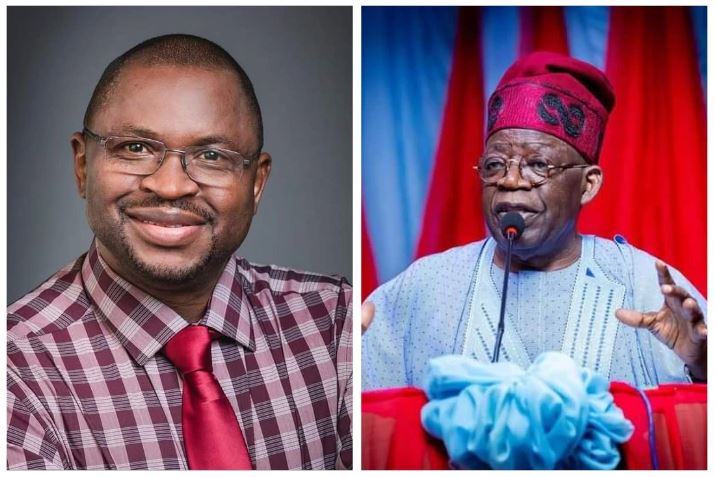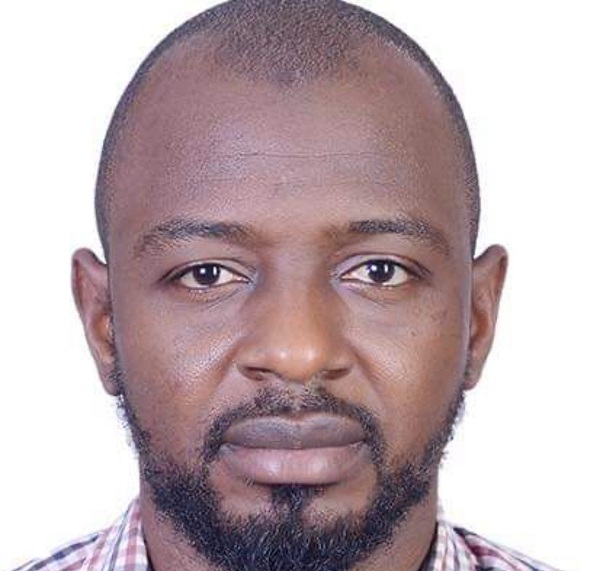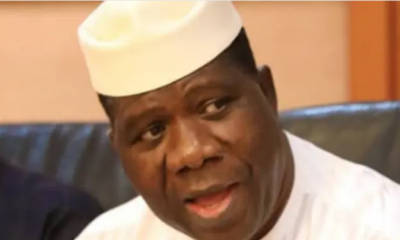GROpinion
Buhari is becoming a liability to APC on corruption, by SKC Ogbonnia


President Muhammadu Buhari’s style on the war against corruption is doing more harm than good to the All Progressives Congress (APC). The beginning of this new year has already seen the APC being dazed with an outrage, and understandably so, because its Presidential Campaign Council for the 2019 General Elections features high-profile politicians facing a myriad of serious corruption charges.
Following the folly was a worldwide fury at Buhari’s blatant attempt to prosecute, without due process, the Chief Justice of Nigeria, Walter Onnoghen, on lesser allegations bordering on corruption. So, what does the president think he is doing with this litany of unforced errors or, rather, an unbecoming pattern of partiality? In case Buhari does not know it, which appears to be the case; the president is ‘going to the well too often’—steadily exposing his storied integrity to the dustbin of history.
Recall that the worldwide goodwill that greeted Buhari’s victory in 2015 was uniquely quaint. The goodwill, remember, was not because of his intellectual capacity. It was neither because of his economic vision nor democratic credentials. Instead, it was due to his no-nonsense track record against corruption.
Upon assumption of office, Buhari did not relent, never ending any brief without vowing to eradicate corruption. He followed by creating awareness, blocking streams of leakages, probing individuals alleged to have looted public funds, and flashing fearsome signals that suggest a true determination to cleanse the Augean stables in the world’s largest black nation.
Buhari’s first major strike was to detain, without bail, a former security adviser, Sambo Dasuki, for allegedly looting over $2bn meant for arms during the previous administration. The Acting Chairman, Economic and Financial Crimes Commission (EFCC), Ibrahim Magu, would later captivate the nation by declaring that the regime has secured over 703 convictions. In fact, the agency made history in 2018 by convicting and jailing two high-profile politicians, Jolly Nyame, former governor of Taraba; and Joshua Dariye, a serving Senator and a former governor of Plateau to long prison terms. This is very significant. Besides the lone case of Olabode George, no prominent politician has served a jail sentence in the Nigerian soil from 2007 until Muhammadu Buhari returned to power.
The EFCC further claimed to have recovered over “N794 billion; $261 million; £1,115, 930.47; € 8,168,871.13; CFA 86,500”, hundreds of properties and other assets with specific mention of St. Solomon Health Care Centre, located at No. 24, Adeniyi Jones Street, Ikeja, Lagos. Any deep inquiry on the figures above ought to reveal a case in the EFCC website where it asserted that “N47.2 Billion and $487.5 Million in cash and properties have so far been traced to the former Minister of Petroleum Resources in the Ex-President Goodluck Jonathan’s administration, Mrs. Diezani Alison-Madueke” The website noted in particular “a $37.5m (N11.75bn) (Eleven Billion, Seven Hundred and Fifty Million Naira) property on Banana Island, Ikoyi, Lagos” and much more allegedly belonging to the same Diezani Alison-Madueke.
Not done, President Buhari appeared to demonstrate that no one is above the law by going after the head of the Legislature, Senate President Bukola Saraki, and his deputy, Ike Ekweremadu, for sundry corruption allegations, particularly forgery and failure to declare their assets.
The snapshot of the President of the Nigerian Senate, Bukola Saraki, being docked at the Code of Conduct Tribunal shortly after Buhari took office was a welcome news and made headlines around the globe.
This impressive evidence on the war against corruption, which I am known to have roundly extolled, would have been enough to vault the APC to an easy victory in the 2019 elections. But Buhari’s modus operandi, which is widely believed to thrive only in injustice and lack of transparency, has become a poisoned chalice.
In other words, President Muhammadu Buhari is inadvertently becoming a liability to the APC on the war against corruption. The context, of course, is clear as crystal.
First, President Buhari has inexcusably refused to reveal the true identities of all the prominent Nigerians who returned corrupt proceeds and the specific amount of money or properties so recovered or seized besides the quotidian case of Diezani Madueke.
Second, the fight against corruption has been selective as evidenced by the failure to prosecute former Secretary to Government of the Federation, Babachir Lawal, whom the president reluctantly sacked for looting public projects being executed by the same administration; Buhari’s glowing praise, instead of condemnation, of his close ally and Kano State governor, Umar Ganduje, who was caught on multiple video tapes receiving bribes from a contractor, among many others.
Fourth, the president has remained indifferent to many cases of underhand practices during the APC primaries, including his shameless acceptance of a N45 million nomination form from a sham support group which negates the section of the electoral law designed to checkmate tainted money in Nigerian elections; and a string of graft allegations hanging around the neck of the National Chairman of the party, Adams Aliyu Oshiomhole. Fifth, the pace and content of Buhari’s second term bid is being shaped by a team featuring a bevy of notorious politicians facing serious corruption charges. The most dumbfounding is the sheer effrontery with Godswill Akpabio who was indicted for looting over N100 billions of public money while in the opposition camp but upon switching to the ruling party emerged an affectionate poster boy for Buhari’s presidential campaign.
The picture Muhammadu Buhari is painting is nothing but that of a man aiding, abetting, and celebrating corruption. Of course, his handlers argue otherwise, but witlessly so. For instance, their common pushback is that presumption of innocence is a legal right of the accused in the Nigerian criminal law, which is true.
But that is errant nonsense in this regard. Common sense dictates that any serious charge preferred by the state against the citizen ought to have basis in fact.
Moreover, Nigerians are appalled that the principle of presumption of innocence is commonly applied to the allies of the Buhari administration while similar reprieve is never considered for his political foes, for example, the developing case of Chief Justice of Nigeria, Justice Walter Onnoghen, among many others.
Very instructively, if the principle of presumption of innocence is to be generalised, some of us in the ruling party might as well apologize to the presidential nominee of the major opposition party, the Peoples Democratic Party (PDP), Atiku Abubakar, who has continued to suffer emblematic stereotype as a virally corrupt figure based on mere allegations.
Even worse, it is preposterous that the EFCC continues to inundate the name of Diezani Alison Madueke as a corrupt dame based on mere allegations while at the same time stroking a defiant audacity to shield the identities of other prominent politicians who are already found guilty of corruption or have returned their loot.
One also wonders the rationale behind the specific reference to St. Solomon Health Care Centre without disclosing similar properties confiscated by the agency.
The objective fact is that Buhari’s pattern of partiality, which is said to be a handiwork of a prostrate cabal, has become grotesque and indefensible.
This explains why, despite what his harshest critics would agree is a measurable success on the war against corruption, the latest Transparency International report within the same period rated Buhari’s anti-graft record as worse than the inglorious effort during the regime of Goodluck Jonathan. Today, even with 2019 general elections on the line, it is becoming increasingly impolitic for the All Progressives Congress (APC) to flaunt Buhari’s integrity as a trump card.
An old saying goes that it is better late than never. Nigerians elected Muhammadu Buhari to be transparent and courageous to demonstrate serious consequences for corrupt activities without minding whose ox is gored. He can still rekindle the hope by correcting the apparent flaws in his war against corruption – no matter how close to the 2019 elections.
After all, if Muhammadu Buhari can jump at any opportunity of doing the wrong thing at the wrong time, for instance, the bizarre plot to remove the Chief Justice of the Federal Republic without due process or an unabashed rash of one-sided appointments at this critical point in the history, nothing stops him therefore from making the needful amends on the war against corruption, regardless.
•SKC Ogbonnia, a former 2019 APC presidential aspirant, is the author of the Effective Leadership Formula.
Columnists
Cybersecurity in 2024: Towards Ever Greater Sophistication of Tactics


Writer: CHESTER WISNIEWSKI, Director Global Field CTO, Sophos
With 2024 fast approaching, what are the results for 2023 and what are the developments in the threat landscape for this new year?
The year 2023 was marked by persistence in the tactics of cybercriminals, with the predominance of ransomware, the exploitation of vulnerabilities, theft of credentials and even attacks targeting the supply chain. The common point in all his attacks is their formidable effectiveness.
It is therefore essential to ask what trends will persist in 2024 and what strategies businesses should adopt to deal with these future cyber threats.
Between persistent trends and evolving cybercrime tactics
In 2024, the threat landscape is not expected to change radically, particularly with regard to attack typologies and criminal tactics and procedures.
Criminal groups still primarily focus their attention on financial gains and ransomware remains their weapon of choice. These cybercriminals tend to take the easy way out by opportunistically attacking unpatched security vulnerabilities.
The recent Citrix Bleed attack demonstrated the agility of cybercriminals when it comes to quickly and effectively exploiting these new vulnerabilities.
However, once patches are applied to these vulnerabilities, cyberattackers tend to revert to more common strategies of stealing credentials or, failing that, cookies or session cookies, which, while slightly slower, constitute always a proven means that allows them to penetrate within a system.
In 2024, however, we should expect increased sophistication in defense evasion tactics, particularly due to the generalization of certain technologies such as multi-factor authentication. These attacks will combine malicious proxy servers, social engineering techniques and repeated authentication request attacks or “fatigue attacks”.
AI and regulations will continue to shape cybersecurity
In 2024, the development of AI will have a positive impact on the efficiency of IT teams and security teams by enabling them to strengthen defenses and work more efficiently, including through the processing of vast volumes of data in the aim of detecting anomalies. It should make it possible to respond more quickly in the event of an incident.
Indeed, analysis of attacks in 2023 showed a shortening of the time between network penetration and the triggering of a final attack – using malware or ransomware. The need for rapid detection and response tools to prevent costly incidents is therefore essential.
Finally, regulatory developments could have a major influence on measures taken against ransomware. The need to take more substantial measures could push some states to penalize the payment of ransoms, which would represent a brake on malicious actors and change the perspective of companies in the event of an attack.
Other stricter legislation, such as the implementation of the European NIS2 Directive, is also expected to force companies to take additional measures, particularly regarding their abilities to collect data sets.
To protect themselves against increasingly rapid, effective and costly attacks, companies will need to strengthen their defenses by equipping themselves with tools that allow them to detect and respond to incidents more quickly.
The worsening cybersecurity talent shortage does not appear to be as serious as some studies claim. On the contrary, companies have implemented more lax hiring criteria and more open-mindedness in the recruitment process.
From this perspective, to guarantee their survival in a constantly evolving threat landscape, companies have every interest in establishing partnerships with cybersecurity experts whose main mission is to make the hyperconnected world safer, to advise and assist them. in setting up effective defenses.
GROpinion
The Internal Threat: The Hidden Face of Corporate Threats


Businesses today face many threats; but if those coming from outside are their main source of concern with a priority focus on ransomware, they too often forget to consider internal threats which can be just as devastating.
In fact, they take less time to assess the adaptability of their internal security measures in case a cyberattacker manages to break through their defenses from the inside and recover sensitive data that is easily accessible to him. So, what are the means to put in place to detect these threats and respond to them effectively?
The sources of these insider threats are diverse and very often undetected or detectable. They can thus be the result of negligence or even malice.
They can, for example, come from an implementation of relaxed security controls that do not apply to certain systems, or from a lack of logging and identification of these malicious activities.
Although, difficult to measure – since they are rarely the subject of dedicated reports – these internal attacks have already affected many companies.
What are the reasons for the appearance of these threats?
Intentionally or not, insider threats are legion. For example, when an employee carelessly forgets a USB key containing copies of critical information on the train, he then neglects to comply with all the rules in force.
This type of situation can be tragic for the company since there is therefore a risk of theft or public exposure of information that could lead to a violation of official regulations imposed by a governing body (usually GDPR, PCI and HIPPA) or by several regulatory bodies’ premises.
The company must then be extremely transparent by disclosing to its employees – and more broadly to the general public – that it has been the victim of a data breach within the organization, and it must also be held accountable. of all actions associated with this data breach.
But it can also be actions triggered intentionally for a wide variety of reasons. An employee may, for example, realize that he has the possibility of carrying out a malicious action in his workplace because of relaxed controls or because he has high visibility.
This type of situation can lead to the theft of confidential information belonging to the company. The employee then seizes this opportunity to harm the company with impunity.
Various flaws and patterns
Cybersecurity experts have identified three distinct insider threat motives which are revenge, greed, and inattention.
The first two reasons include, for example, intentional and accidental acts, and are more likely to occur following a dismissal or a resignation. However, these reasons vary according to the type of activity of the company.
In the case of the defense sector, it can be corruption or espionage, unlike the ICT sector, where commercial data theft is more widespread.
Employees in charge of selling products and solutions can thus save their customers’ contact details in files and programmers can steal the source code. Despite their media coverage, on the whole, cases of espionage or sabotage remain, fortunately, exceptions.
More generally, data leaks are often caused by insider threats, when sensitive information belonging to the company becomes “uncontained”, when it should be classified confidential according to the operational context.
This information then becomes “public” and people whose position has nothing to do with it can consult it. Very often, when businesses are faced with such accidental data loss or leakage, it is the result of carelessness, inadvertence or clumsiness – such as the loss of mobile devices, USB storage media or public exposure of repositories stored in the cloud.
The classic example of accidental data release comes from the use of the “To” and “CC” fields when sending an email to multiple external recipients, where personally identifiable information is exposed to all of these recipients; a situation that could have been avoided by using the “CCI” (blind copy) mode.
Finally, data destruction is also a typical action where the integrity and availability of data is taken away from the business.
This has the effect of preventing him from accessing critical information, which can directly impact the operational capacity of the company. While this activity is mostly associated with ransomware operators, it can also be attributed to insider threats.
It should be borne in mind that there are many reasons that could lead to such acts, but the main reason remains that the data is generally stored in a weak way, which allows too many people to access information that has nothing to do with the tasks entrusted to them.
These people can steal sensitive data for revenge, but also destroy it or remove it from the company or even try to extort its return.
How can we best respond to these threats?
The implementation of a strategy to prevent these internal threats remains difficult to implement, since once the attack has been launched, anticipation and control are already outdated. It is therefore extremely important to set up preparation sessions aimed at determining the impact of these attacks.
Thus, training employees in the correct use and understanding of internal company systems and processes can go a long way towards avoiding errors associated with accidental data leaks.
In addition, it can be useful to turn to several solutions and tools such as file and document management systems to better manage the critical data that the organization has in its possession. ZTNA limits access to only required tools/services/apps rather than everything on a company’s LAN.
It is also possible to employ Data Leakage Prevention (DLP) tools, capable of preventing accidental data leaks – except in the case of intentional theft. XDR systems and firewalls can also be very useful as part of the disaster prevention and recovery plan because they allow DLP to be implemented and log access and data movement at the same time. Their actions facilitate forensic work, particularly in understanding failures and their consequences.
Finally, the implementation of technical controls capable of regulating access to data and systems that contain sensitive information, as well as the monitoring of the results of these controls and the responses to violations of the security policy contribute to the detection of ‘a malicious attack in progress.
To protect their company and their employees from these internal threats, managers must imperatively limit access to the data to the persons concerned and ensure the implementation of strict controls on the most sensitive data, while providing them with the support they need.
In essence, therefore, the right balance must be struck between people, process and technology, since any imbalance can favor the introduction of instability, as well as an easier increase and spread of risks – whether they either external or internal to the company.


I’ll start on this by referring you an earlier piece I had written on 17 April, 2021 about Professor Farooq Kperogi when he attempted to hoodwink his readers and Professor Pantami that he was the latter’s friend but still went ahead to disparage him by spewing lies and supposed private matters on the Professor, the piece can be read here.
At that point, I had just switched from being his ardent fan to seeing him for who he really is, a propaganda merchant who thrives on the docility of Nigerians to cash out.
Kperogi had to acknowledge that article as it bursted his little games on 24 April, 2021 in his column tagged ‘On my friendship with Pantami’ and which can be read here.
I read Kperogi piece of today 11th February, 2023 where he attempted to as usual disparage Buhari’s naira policy and linked it as a ploy to stop a BAT and I found the analogy in it very ludicrous to say the least. I wonder why Kperogi has developed a permanent feeling and understanding that Nigerians are extremely daft and so he could spew anything at them albeit hypocritically after cashing out his little coins behind the scene.
Kperogi is a supporter of Tinubu but just like so many Nigerians who share his type of double character, he is finding it difficult to come clean about it, so he is using mind games this time around to blame Buhari and his policy as the reason why Tinubu would fail even though according to him, he doesn’t want it but he would prefer that the failure of Tinubu occurs through ballots and not through sabotage.
However, what Kperogi and the likes who don’t have the audacity and criticality to formulate critical campaign strategies to market Tinubu don’t understand is that the suffering of Nigerians which had largely made them to make up a mind did not start with the naira scarcity and it’s attendant suffering which in my opinion is over bloated by the likes of Kperogi and other propaganda merchants to unfairly blackmail Buhari into succumbing to perhaps use state resources to install Asiwaju as president and that won’t happen because in reality Nigeria has long moved away from such. You have to have some level of popularity to rig elections in any society and rather than campaign enough to get the masses support for Asiwaju, Kperogi and the likes believe the victory must only be gotten through blackmail.
While on my way back from office yesterday, I critically examined the menial marketers like ‘suya’ sellers and the rest, and I saw a normal activity going on as I used to know it and I wondered in my mind where the excessive suffering that was been hyped was? It has also been established and I know that those people in the remote villages that Kperogi attempted to refer to do not need more than one to five thousand Naira to transact and while in the beginning things got a little rough, POS merchants have since gotten cash for them and things are normalizing, so I’m sure that the whole propaganda about suffering is being spewed by some political elements who perhaps see free and fair contest as a threat to their victory and such narrative has to stop quickly because in recent past it was same kind of narrative that made Jonathan loose elections, Nigerians desist such fearful narrative.
Furthermore, Kperogi alluded to the fact that Asiwaju always used billion vans to win his way through elections, assuming without conceding that was true as coming from him, is Kperogi then telling us that he supports a corruption of the electoral system? If anything, is ensuring a free and fair contest by Buhari not worthy of commendation? I can bet you Nigerians especially those from
Northern Nigeria have accepted this policy not because there are not minor and temporary discomfort about it but because they see it from the prism of Buhari doing what he ought to have done a long time ago which was to annihilate corruption and its practices, so it appears the people were ready to bear this brunt in as much as it guarantees free and fair contest.
Speaking about a payback by Buhari after Tinubu had supported him, I have maintained in different fora that the agreement for the reciprocation was a party matter and that had been settled at the primary elections because indeed all stakeholders allowed Tinubu to emerge even though they had other preferences which is normal with every human. However, general elections are a totally different games because there are other contestants and it is a democratic regime we are in where numbers of votes garnered matters most, so Kperogi and co should rather concentrate on fetching votes for Tinubu rather than blackmailing Buhari to hand over powder to Tinubu already baked.
Kperogi supports Tinubu,I knew this penultimate the primary elections, when he kept dropping hammers on Osinbajo, a contract he collected to disparage Osinbajo in the eyes of the northerners so as to pave way for Asiwaju and that worked but the current one won’t work because the ordinary people from the north have bought into it to a large extent maybe not so much from the beginning of it but much more now. Rather than all these intellectual shortcuts, I have advised the APC and it’s campaign to make appropriate recruitments to formulate strategies and such recruitments can be out of the ‘big names’ and the usuals, there are millions of smart boys and girls out there who can beat Kperogi and the likes to their cheap and opportunistic games, Daniel Bwala is one of such examples!
May the best man win for Nigeria’s increased progress, Amen!


-



 Politics4 days ago
Politics4 days agoFuel Scarcity Will Soon Be Over – Senate Leader Says
-



 News3 days ago
News3 days agoFirst Man To Receive Pig Kidney Transplant Has Died
-



 Health3 days ago
Health3 days agoFP2030 Report Links Family Planning & Gender Equality
-



 Politics3 days ago
Politics3 days ago“Supporting Sim Fubara Was A Mistake” – Wike Announces
-



 News2 days ago
News2 days agoMath Teacher Accused Of Having Sex With 2 Students And Getting Pregnant For One Tearfully Reveals The Baby Was Taken Away From Her
-



 Politics2 days ago
Politics2 days agoPresident Tinubu Bans Purchase Of Petrol-dependent Vehicles By FEC Members
-



 Entertainment20 hours ago
Entertainment20 hours agoMen Of The Lagos State Police Command Have Arrested Singer Portable






